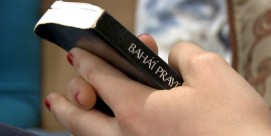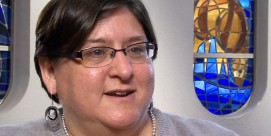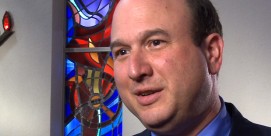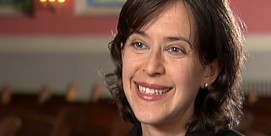In This Episode << SLIDE LEFT TO SEE ADDITIONAL SEGMENTS
Rabbi Alan Lew on Spirituality of High Holy Days
BOB ABERNETHY, anchor: On our calendar this week, Rosh Hashanah, Friday — the Jewish New Year that begins the annual High Holidays. We talked with Rabbi Alan Lew of Congregation Beth Shalom in San Francisco, who has written about the High Holidays in his new book, THIS IS REAL AND YOU ARE COMPLETELY UNPREPARED.
Before he became a rabbi, Lew practiced Zen Buddhism for 10 years. Now, he blends Jewish and Buddhist traditions in his practice. Rabbi Lew says the High Holiday spiritual transformation process for Jews actually began on Tisha b’Av, last month, mourning the destruction of the Jewish temples in Jerusalem.
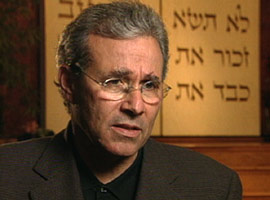 Rabbi ALAN LEW (Congregation Beth Shalom, San Francisco): The point of the High Holidays is atonement, reconciliation, a restitution to wholeness. So it makes sense that a journey that ends that way should begin with an acknowledgment of alienation and estrangement, and that is the theme of Tisha b’Av.
Rabbi ALAN LEW (Congregation Beth Shalom, San Francisco): The point of the High Holidays is atonement, reconciliation, a restitution to wholeness. So it makes sense that a journey that ends that way should begin with an acknowledgment of alienation and estrangement, and that is the theme of Tisha b’Av.
Tisha b’Av is the time when the temple was destroyed, and the temple was the place where one felt the palpable presence of God.
After acknowledging that we are in fact estranged from ourselves, from others, from God — for the next 30 days there’s a very rigorous period of introspection. The essential gesture of this entire period is to become more mindful, to become more aware both of our own situations psychologically and spiritually, or those things that we’ve been doing that aren’t so productive.
So the closer we are to being in the present moment, the more mindful we are, the closer we are to God. God is here; if we are elsewhere, we are estranged from God.
So the blowing of the shofar is connected to this mindfulness, this process of becoming mindful, it calls us to it. It wakes us up literally — it’s an alarm clock.
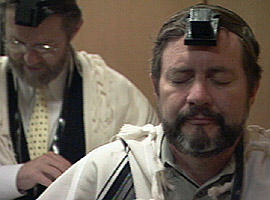 When we are really immersed in the act of prayer, we are not so much asking for things, and we are not so much trying to bend God’s will to our own, which I think [is] what we ordinarily think of prayer, but we are really engaging in an act of self-judgment.
When we are really immersed in the act of prayer, we are not so much asking for things, and we are not so much trying to bend God’s will to our own, which I think [is] what we ordinarily think of prayer, but we are really engaging in an act of self-judgment.
Part of the reason that we are able to effect a reconciliation with God during this season [is] because we realize how desperately we need God, we realize we can’t do all these really difficult things without a sense of a transcendent consciousness beyond our own.
Rosh Hashanah is the day when the gates to heaven open, and it’s a very rich symbol, suggesting both access to the presence of God during this time, extraordinary access, suggesting a time of transformation … that if we read the book of our life, we can see ourselves and we can stop jumping into fires that we are wont to do and stop doing unconscious hurt to others.
Yom Kippur, the very end of this process, is a time when we literally rehearse our own death, and we intone this endless liturgy of who will live and who will die, and we abstain from all activities that living people engage in, like eating and sexual activity.
We can evoke the power of our death to show us our lives. The most intense times are those last several hours of Neillah when the gates are closing. I can literally hear and feel those gates clanging shut. And then the shofar blows and there is a tremendous feeling of lightness.
We spend the rest of the year in a greater state of awareness.

